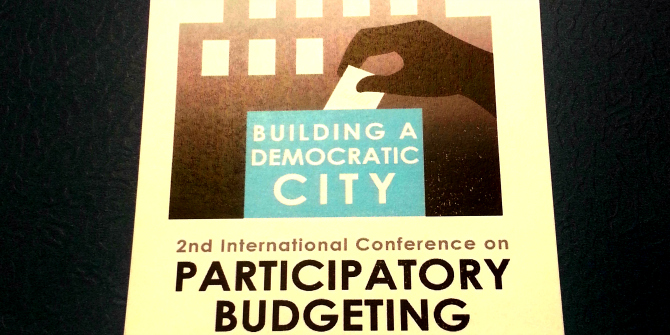 A collection of Marxism experts explore and analyse the causes of the financial crisis from an alternative intellectual framework in this latest volume from Emerald Books. Daniel Sage feels that the collection fails to relate to a wider audience and to revitalise new ways of thinking, and with debates around academic impact growing ever more intense, the authors need to take their ideas and translate them to wider audiences; not just within the social sciences, but to the general public.
A collection of Marxism experts explore and analyse the causes of the financial crisis from an alternative intellectual framework in this latest volume from Emerald Books. Daniel Sage feels that the collection fails to relate to a wider audience and to revitalise new ways of thinking, and with debates around academic impact growing ever more intense, the authors need to take their ideas and translate them to wider audiences; not just within the social sciences, but to the general public.
 Revitalizing Marxist Theory for Today’s Capitalism. Paul Zarembka and Radhika Desai (eds.). Emerald. November 2011.
Revitalizing Marxist Theory for Today’s Capitalism. Paul Zarembka and Radhika Desai (eds.). Emerald. November 2011.
In April 2012, the Guardian’s Aditya Chakrabortty laid down a controversial challenge to the social sciences. In the aftermath of the financial crisis, Chakrabortty argued that ‘taxpayer-funded intellectuals’ had failed the public. This is because the majority of social scientists had, for too long, stepped aside for mainstream economists to dictate the political and economic agenda. When this agenda catastrophically fell apart in 2008, there was a unique opportunity for sociologists, political scientists and unorthodox economists to ‘change capitalism itself’, no less. But according to Chakrabortty, this opportunity was missed. Debates about what caused the crisis and what a new model of political economy would look like have been missing from the annual conferences. Here, you are more likely to hear about bodybuilding and the over-60s than a new form of capitalism.
Chakrabortty’s challenge has mirrored other debates within academia. Writing for the British Politics and Policy at LSE blog for example, Peter John explored the argument that political science had become detached from public life. This purported ‘detachment’ was also implied by Chakrabortty, who argued that the state of social science wasn’t always so hopeless and that Marx, perhaps most famously, was able to fuse intellectual rigour and innovation with a prominent public life.
Out of all the classic economists and critics of the free market, it is Keynes rather than Marx who has enjoyed a revival since the financial crisis. Perhaps understandably, the disaster of communism continues to embed the sense that Marxism fails as a serious system of alternative economic thinking. Yet as this recent BBC series from Stephanie Flanders showed, Marx was as much a theorist of capitalism as a proponent of communism. What he had to say about the workings (and failings) of capitalism could, therefore, teach us as much today as in the nineteenth-century.
So does this new collection of articles, Revitalizing Marxist Theory for Today’s Capitalism, edited by Paul Zarembka and Radhika Desia, achieve this goal? This edited collection of papers is split into three parts. The first part considers the limitations of mainstream economic thinking into the growth mechanisms of capitalism, with a parallel discussion regarding the destabilizing impact of financialization to Western economies. This section argues that much can be learned about the crisis by employing Marxist forms of analysis, something mainstream economists have ignored for too long.
The second section of the collection is more theoretical than applied. In particular, it contains two newly translated works, as well as an evaluation of Lenin’s economic theory from a Marxist perspective. Finally, the last part of the book includes a debate between two academics concerning the role of positivism within Marxist scholarship.
Given the critique against the social sciences outlined above, it is most likely the first part of this book that will interest non-Marxist outsiders: what can we learn from Marxism, for example, that will help us better understand the crisis? Rémy Herrera offers an immensely detailed (and often complex) critique of conventional theories of economic growth. Here, Herrera argues that ‘neoclassical’ models of growth are technically flawed and that the way forward is for new forms of state planning, informed by the intellectual ‘instruments’ of Marxism.
Riccardo Bellofiore’s contribution examines how the causes of the financial crisis are far more complex than many people often assume. It is not possible, argues Bellofiore, to simply attribute the crisis to a ‘perverse’ financial services system. Rather, the Great Recession should be better understood by grasping Marx’s theory of crisis: that ‘accumulation is a contradictory process’ and, thus, ‘crises are the necessary expression of such contradictions and their temporary solution’. Capitalism, we are reminded, has an arguably innate propensity towards volatility and crisis. Another contribution by Chernomas and Barager explores the path that led from the response to the stagflation of the 1970s to the financial crisis of the 2000s, while Özgür Orhangazi roots the crisis in the escalating and contradictory division between the ‘financial’ and ‘real’ sides of the economy.
The authors here are all clear experts on Marxism and to some extent meet the challenge put to social scientists: to explore and analyse the causes of the financial crisis from an alternative intellectual framework. Yet according to Chakraborrty, this is only part of the challenge the social sciences face. The other part is about relating such alternative frameworks to a wider audience: to bring to people – or ‘revitalize’ – new ways of thinking.
On this criteria then, Revitalizing Marxism fails. There is a sense that the collection is written by and for a niche group of academics; a sense only expounded further by the deeply technical style of some of the contributions, which will make parts of the book unintelligible to non-economists. To some extent, this is an unfair criticism. Revitalizing Marxism is clearly not an attempt to reach out to a wider audience of academics but to develop ideas within an existing school. Yet to genuinely ‘revitalize’ Marxism, the authors need to take their ideas and translate them to wider audiences; not just within the social sciences, but to the general public. Arguably, this is where the future efforts of Marxists should be concentrated.
——————————————————————————————-
Daniel Sage is a PhD student at the University of Stirling. His PhD thesis explores how welfare-to-work reforms have affected the experiences and interactions of benefit claimants with the welfare system. Additionally, he has academic interests in income inequality and social cohesion, public attitudes towards the welfare state and the politics and philosophy of social policy. He has a BA in History from University College London and an MSc in Social Policy from the LSE. He tweets at @djsage86 and blogs at http://knowledge-is-porridge.blogspot.com. Read reviews by Daniel.








2 Comments